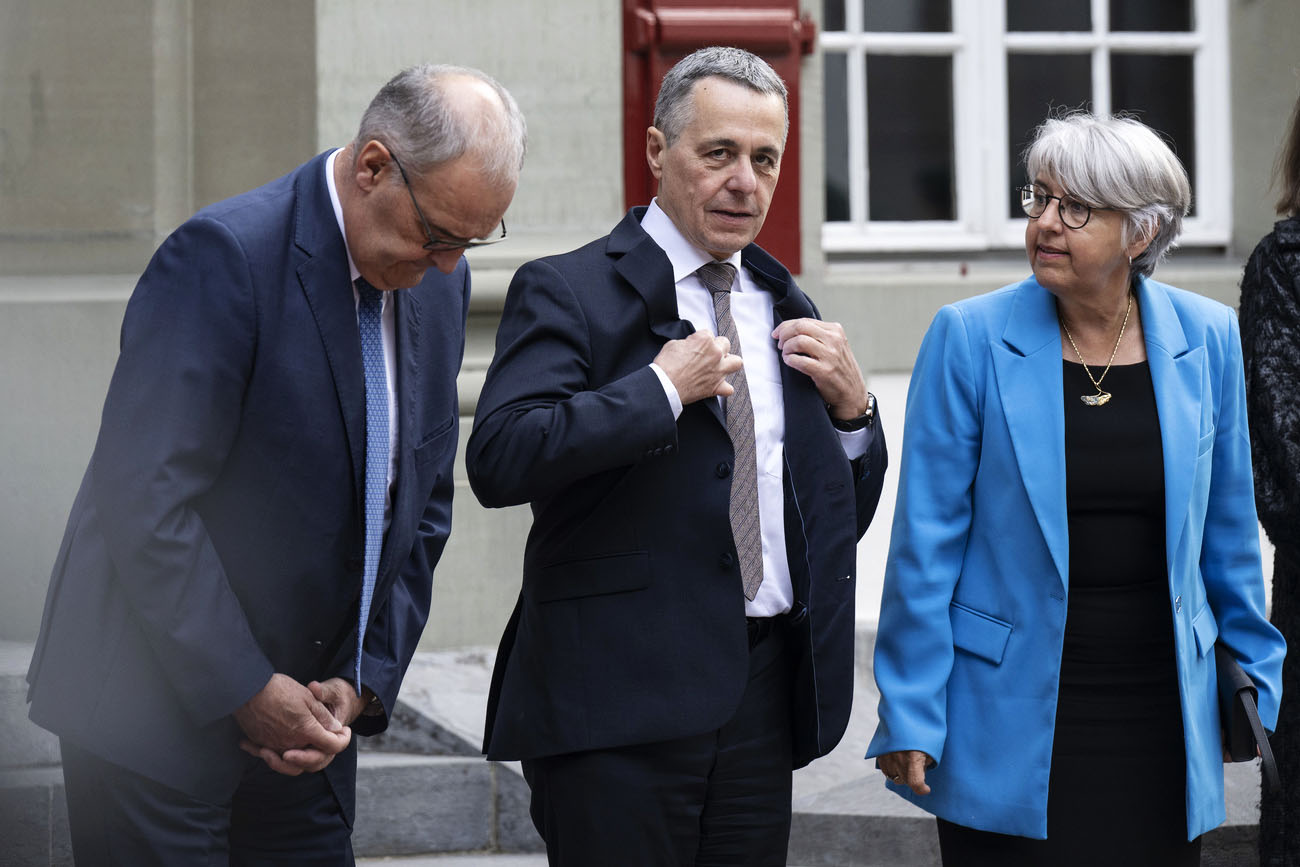
Swiss President Viola Amherd, left, and Ursula von der Leyen, President of the European Commission mark the official start of negotiations between Switzerland and the EU on March 18, 2024.
Keystone / Alessandro Della Valle
Although the Swiss population has little enthusiasm for the European Union, it considers the bilateral agreements with Brussels to be important. These are the findings of a new survey.
Relations with EU remain sensitive and highly controversial in Switzerland, according to a survey by research institute gfs.bern for the Swiss Broadcasting Corporation. The responses of almost 20,000 Swiss on bilateral agreements with the EU reveal extremely divided opinions.
The majority of the Swiss population recognise the importance of the EU for the Swiss economy. This rational, economic view is shared by all political stripes. There is, however, a major fissure: on an emotional and personal level, a feeling of distance and indifference dominates in the hearts of the Swiss.
“Is it about me or the Swiss economy as a whole?” This question sums up the dichotomy in which the upcoming negotiations will take place, according to the survey’s authors.
“The EU issue is highly polarised,” says Martina Mousson of gfs.bern. “The main, highly emotional criticism is a concern about Swiss sovereignty,” adds the political scientist, pointing out that the issue is deeply divisive.
Negotiations between Berne and Brussels on updating the bilateral agreements are nearing a conclusion. As a new debate on the EU seemed inevitable, the idea behind the survey was to get a glimpse of the electorate’s opinion.
The subject has been absent from Swiss public opinion of late. However, the fact that almost 20,000 people took part in the survey shows that there is a great deal of interest in the subject.
Perhaps it is the calm before the storm and the EU debate will resurface when the negotiations have produced a result that needs to be evaluated.
A critical view of the EU
The EU triggers mixed feelings among the Swiss and there is a slight dominance of negative perceptions, says Mousson. The EU is viewed most critically in Italian-speaking Switzerland. In Ticino, prices and wages have come under severe pressure as a result of immigration from Italy.
Despite far-reaching criticism of the EU as an institution, its importance for the Swiss economy is widely and clearly recognised. “This is the ambivalence in which opinions are formed,” summarises Mousson.
Those who view the EU positively see it as a project for peace and prosperity. The positive view is also characterised by the idea of a European idea, a community of values with common goals and interests.
Majority see a bureaucratic monstrosity
This approving view of the EU is supported by people who feel European and value relations with neighbouring countries but they are few. “People with a positive image of the EU are in the minority,” says Martina Mousson.
The majority see the EU as a bureaucratic monstrosity that is denying Switzerland its right to have a say. Respondent statements include: the EU is a bureaucratic juggernaut, it is not in a position to respond properly to the world’s major challenges or it is undemocratic.
More

More
Switzerland and EU want to negotiate, but optimism is limited
This content was published on
Mar 18, 2024
Bern and Brussels want to negotiate their future relationship. Can this be a good thing?
Read more: Switzerland and EU want to negotiate, but optimism is limited
“The negative sentiment is complex and multifaceted,” says Mousson. “It is dominated by a strong desire for self-determination and freedom.”
The bilateral agreements are still convincing
The Swiss electorate’s view of the bilateral agreements that govern Switzerland’s relationship with the EU is equally ambivalent. Most people think that the country would be worse off without them and that they benefit the Swiss economy.
However, a majority also share the impression that the free movement of persons clause has led to a high level of immigration and that this places an additional burden on Switzerland’s social welfare system. The following statements also met with majority approval: ‘domestic wages have come under pressure’ and ‘the bilateral agreements are driving up rental and real estate prices’.
Overall, however, a positive assessment of the bilateral agreements prevails.
When asked about the ongoing negotiations, almost three quarters consider them important and more than half also consider them urgent. Swiss People’s Party voters see them as unimportant.
Lukas Golder from gfs.bern sees a future discussion along two poles: on the one hand, there is a sober approach, which says that new bilateral agreements are good for the country and help the economy. On the other hand, there are the emotions of rejection and distance. “Emotions are more relevant today. And these emotions do not necessarily stand for the further development of bilateral relations,” says Golder.
A convincing vision is lacking
According to Martina Mousson, if the issue is put to the people one day, it will most likely lead to a fortress mentality – meaning that “many people are not open to arguments”. In order to overcome these divisions, a common vision of Switzerland’s future would be necessary. But this is lacking. “There is no strongly convincing vision on this issue,” says Mousson.
Edited by Giannis Mavris. Adapted from German by DeepL/ac
Articles in this story

